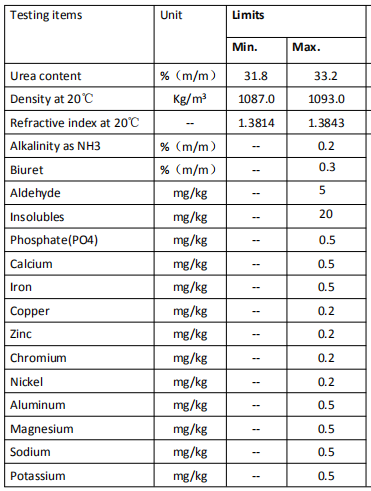 +86 20 26211661
+86 20 26211661
 +86 20 26211661
+86 20 26211661

(1) Urea content: The AdBlue® content directly affects the catalytic efficiency of NOx and the freezing point of the AdBlue®. In the SCR reduction system, the concentration of urea solution is one of the key factors. Too high or too low concentration can not improve the conversion efficiency of NOx, but also cause the slip of ammonia (due to the excessive NHs/NOx ratio) then forming secondary pollutants (ammonia gas). Most diesel vehicle manufacturers in Europe tend to use AdBlue® with concentration of 32.5% as a reducing agent because this concentration has the lowest crystallization point (initial crystallization point -irc). It is necessary to take insulation measures , if the vehicle urea solution is used below -irc . Therefore, 32.5% (±0.7%) is selected as the concentration of the AdBlue® for the vehicle and should be sealed when stored.
(2) Alkalinity: AdBlue® can be hydrolyzed to produce ammonia under the action of acid, alkali and enzyme (acid and alkali need to be heated). If the alkalinity is too high, some AdBlue® is impure or has been decomposed. This index controls the ammonia content in AdBlue®.
(3) Biuret: By-product biuret is produced during the production of AdBlue®. In addition, AdBlue® is easily condensed into a biuret if not stored properly. Biuret requires strict control as an impurity in the AdBlue® . The ISO22241-2 standard uses a spectroscopic method to pre-establish a working curve of biuret content and absorbance, then test the absorbance of the sample and determines the biuret content in the sample on the working curve.
(4) Insoluble matter : Insoluble matter is a water-insoluble impurity in AdBlue®, it is harmful to a conveying pipe and a nozzle of AdBlue® and may cause clogging. The measurement method is a method of weighing the insoluble matter by using a filtered sample.
(5) (In terms of HCHO): Formic acid is used as an impurity in AdBlue® and it must be strictly controlled.
(6) Density: The density and concentration of AdBlue® are closely related. There is data showing that the density and concentration of AdBlue® have correspondence at a certain temperature and the increasing density with increasing concentration. The detection density helps to verify the concentration and quality of AdBlue®.
(7) Refractive index: The concentration of AdBlue® is also closely related to the refractive index. Similar to the density, the refractive index and concentration also have a corresponding relationship at a certain temperature and the refractive index increases with the concentration. Measuring the refractive index helps to further verify the concentration and quality of the AdBlue®.
(8) Pity salt: Phosphorus and diacid salt are one of the items that need to be strictly controlled in the standard because they can deactivate the catalyst poisoning of the SCR system for AdBlue®.
(9) Metal ions (calcium, iron, aluminum, copper, zinc, chromium, nickel, magnesium, sodium, potassium): Metal ions are impurities in the urea solution for vehicles, which have a toxic effect on the catalyst of the SCR system. The conversion efficiency of system catalytic reduction requires strict control of the content of these impurities. The SCR catalyst is the core of the SCR system reduction technology. The direct reducing agent that undergoes selective catalytic reduction is NH3 instead of urea itself , after AdBlue® is injected into the exhaust unit. AdBlue® is relatively stable in the intermediate product HNCO (isocyanate) of the SCR system and it can be further hydrolyzed to produce NH3 under the action of the catalyst only under high temperature (300~50 CrC).
Therefore, the activity of the catalyst is critical to improve the conversion efficiency of the entire SCR system. The metal ions can deactivate the VzOs / WCVTiOz catalyst in the SCR system of AdBlue®, which reduces the conversion rate of NOx. Therefore, in order to protect the catalyst of the SCR system and increase the reduction rate of nitrogen oxides NOx , the content of the above metal elements should be strictly controlled.
EverBlue Chemicals is an professional adblue® manufacturer in China.We're the branch of "BlueBasic"-Italian company in China. All of our products got the SGS & ISO & VDA certificates. And we will keep the samples of each shipment for quality tracking.
 online service
online service +86 20 26211661
+86 20 26211661 sammi@everblue.com.cn
sammi@everblue.com.cn Sammi Sun
Sammi Sun +86 137 1902 0590
+86 137 1902 0590